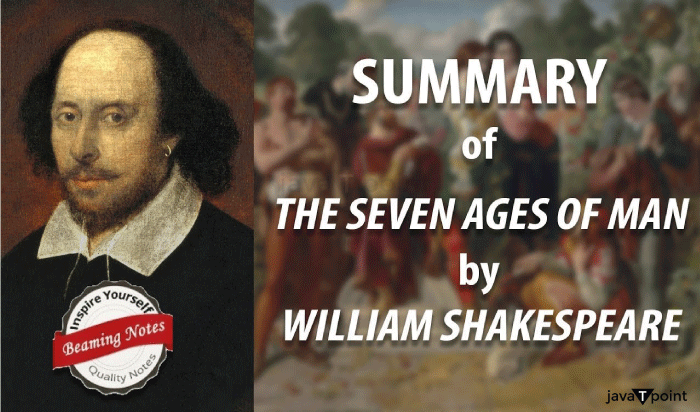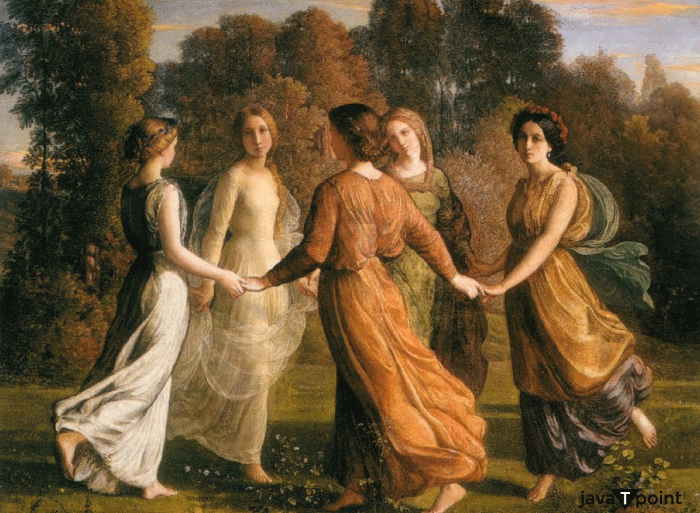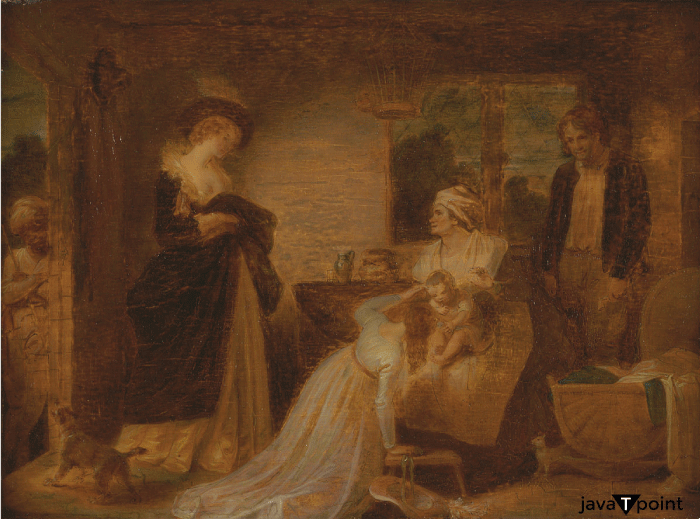The Seven Ages of Man SummaryWilliam Shakespeare's "The Seven Ages of Man"Introduction:The Seven Ages of Man, popularly known as "All the World's a Stage," is a line from the comedy "As You Like It" by English playwright William Shakespeare. The conversation takes place in Scene VII of Act 2, in the Arden forests, between Duke Senior and Orlando and the brilliant philosopher Jacques. While they are eating, Duke Senior confides in Jacques that while the world is filled with joy, he and his troops are alone and unhappy. 
The reply Jacques gives to Duke Senior is the "Seven ages of man." This reply has two purposes: first, to comfort the grieving Duke Senior, and second, to convey to the play's audience that sadness is a natural part of life and that we all experience different stages. Additionally, the passage is seen as the character's commentary on the pointlessness of existence. Shakespeare's time saw a lot of discussion about the "ages of man," thus this passage wasn't quite as well-known as it is now. Four ages of man were suggested by Aristotle, and the concept has persisted ever since. Shakespeare divides life into seven eras, which is a novel compared to prior writers and philosophers who often divided life into three or four ages. The Nyaya System, specifically its "Ashrama Dharma," which divided a man's life into four eras-Brahmacharya-ashrama, Grihasta-ashrama, Vanaprasta-ashrama, and Sanyas-ashrama-also has a comparable and more well-known system of ages or phases of life. The Poem's Theme is:
The poem reflects philosophically on our life and our surroundings in it. It draws sweeping generalizations about how people develop in life and reduces the complexity of human life to a series of incredibly basic stages. In just seven phrases, the conversation of Jacques covers the totality of life for humans and the poet's viewpoint on it. The conflict offers a compelling counterargument to the poet's claim that life is pointless. This feeling is skillfully handled throughout the play. For example, the phrase "And so from hour to hour we ripe and ripe, and then from hour to hour we rot and rot, and thereby hangs a tale" appears in the same scene. This further supports the dialogue's idea of the pointlessness of life. Technical Aspects and Form:
Rhyme:The dialogue doesn't rhyme in any way. No internal rhymes can be found. The prodigious use of alliteration and repetition more than makes up for the lack of this, though. Shakespeare here is more concerned with the dialogue's content than with its meter and rhyme. But throughout the text, consonant sounds appear to be repeated. The most common instances are players, plays, parts, puke, and men, simply, man, numerous, mewling, morning, etc. The final phrase, in which the word "sans" is repeated four times for more poetic effect, is the greatest example of repetition being utilized to stress and dramatize a single sentence. Rhythm:A brief look suggests the poem misses the traditional meter that is maintained throughout. It's noteworthy to observe that, with the exception of the opening line, each line has between 10 and 11 syllables. The poem alternates between stressed and unstressed syllables throughout, yet the conversation doesn't have a consistent rhythm. Figures of SpeechAs one would imagine, the discourse is packed full of phrases. Some of them are included here, along with some of their best examples. Metaphor:The topic of discussion opens with the well-known metaphorical statement "All the world's a stage," which compares the globe to a theater and its inhabitants to performers. Antithesis:The third line is an example of antithesis with the terms "exits" and "entrances" appearing on the same line. Simile:Examples of similes in the dialogue include "creeping like a snail," "sighing like a furnace," and "bearded like a pard." Explanation of the Poem line by lineThere are various interpretations of this famous and frequently repeated sentence. Since Shakespeare was a playwright, he must have naturally found it appealing to compare the world to a theater. Before Shakespeare, there was a belief that the entire world was a theatre, which Richard Edwardes popularized. He notices the connection between the real world and the theater, noting that both are dynamic environments. According to Shakespeare, all men and women are performers on the global stage in the drama that is life. The phrase "merely" conveys to us that he sees a single human existence as insignificant and little in the great scheme of things. It also makes a reference to the author's belief in a higher power, either nature or nature's deity, to whom we are inferior beings. The character's voice conveys a sense of vanity and existential agony. The speaker is discussing the inevitable nature of life and death. Here, it's important to focus on the multiple meanings of the terms "exits" and "entrances." It's not just about life and death, says the speaker. Additionally, he discusses interpersonal interactions. In our lives, people come and go, and relationships are formed, strained, and then repaired. The speaker's placement of exits before admissions, which contributes to the scene's overall gloomy vibe, is also particularly notable. Man plays several roles during his lifetime, according to the first part of this sentence. The word "parts" has a wider meaning than only "ages," which is just one restriction on its use. It refers to the various roles we play in life, such as that of a kid, parent, sibling, husband, etc. The line's final clause states that a person performs these several roles spread throughout seven acts, each representing a different age. This is another Play comparison. This dialogue's introduction makes a brilliant connection between theater and real life. The Ages areAccording to Shakespeare, a man goes through the following seven phases in his life: Stage one: InfancyWhen the nurse initially picked up the baby, it was mewing and throwing up. Birth marks the beginning of life. The beginning of life is birth. A newborn baby is utterly unconcerned with the problems of the outside world. Infants are helpless and reliant on their mothers and caretakers. As a result, it is clear that the speaker refers to the beginning of life as the stage of dependency. Infants can only cry; they have no other means of communication. Additionally, they are unable to consume and are reliant on their mother's milk. They throw up a lot. In Shakespeare's era, nurses delivered infants at home in England. The mewing and spitting up in the nurse's arms paints a picture of a newborn baby. However, this stage is not solely restricted to the newborn phase. This stage of life lasts until the baby is old enough to start school. Stage two: Childhood"Then comes the whining schoolboy, with his satchel and bright morning face, crawling unwillingly to school." The newborn matures into an infant. His guardians and parents send him to school so that he may learn about the ways of the world because he no longer need their undivided care. The child, however, who has only experienced affection and admiration from those in his local environment, opposes the change. To keep from being separated from his parents, he whimpers, screams, and acts out. However, the parents insist that he attend school because they believe it is in his best interests. He is made ready for school by being dressed in the right clothes and receiving a school bag. However, the little child refuses to attend school. Because only a select few people could afford schooling even in the writer's day, this depiction of the second stage of a person's life is a generalization. The majority of the kids were either homeschooled or picked up their knowledge of the world via observation. Third stage: Adolescence"Then came the lover, When his mistress's eyebrow was raised, he sighed like a fire and sang a sorrowful ballad. The educated youth is thus in the prime of adolescence when it begins. The once-child now spins love-inspired fantasies. He notices fresh adjustments in his body and mind and experiences new feelings. He longs for his mistress and has love in his heart for her. He creates and performs melancholy ballads in praise of his mistress's form and attractiveness. The world is full of roses and cherry blossoms in the lover's eyes; he finds beauty in everything. A person experiences beauty throughout this time in his life, along with feelings of lust and infatuation. Additionally, we should strive to keep in mind that Orlando's male lead is a third-generation adult. Rosalind, the play's protagonist, is the object of his intense love, which he is unable to express. Fourth Stage: YouthThen a soldier appeared bearded like a pard, full of odd swears. To seek the bubble reputation even in the mouth of a cannon, one must be envious of honor and eager to argue. The age of a young soldier comes next. The kind lover gradually changes into a warrior on the battlefield of life. Soldiers swear weird pledges of loyalty and honor and uphold them with their lives. The speaker says that a soldier has a panther-like beard. He has a never-give-up mentality and is gutsy and spirited. They fervently defend their honor and don't hold back when it comes to arguing their case. They value honor and reputation highly at this point in their lives, and they would always choose death before compromising their reputation. As a result, this period of life is characterized by vigor and courage, and it marks the transition of a boy into a man. A Fifth Stage: Mid-Life"And then the justice, in a round, beautiful belly lined with fine capon, With sharp eyes and a beard with a formal cut, full of sage advice and contemporary examples, he performs his part. The soldier is then viewed as a judge dispensing judgment and defending the populace with law and order when he reaches middle age. Again, this is a generalization; the occupations that Shakespeare picked for the discussion are not always the way that people lived their lives, nor is it a guarantee that the professions are organized in the same way. The justice is shown as a well-off, round-bellied guy who is eating chicken, which the speaker jokingly says is lined with fat in his belly. He has serious eyes and a beard with a formal cut, both of which allude to his harsh personality. He carries out his duties by dispensing information and performing the responsibility of justice; he is full of wisdom and uses contemporary instances when they are relevant. Sixth Stage: Senescence"The sixth age changes into the lean and slipper pantaloon, With sunglasses on his nose and a bag on his side; his young hose, which had been well-preserved; and his huge masculine voice, which was once again leaning toward childlike treble and pipes and whistles in his sound; the world was too broad for his shrunken shank. According to the speaker, the middle-aged man's journey into senescence occurs at the age of six. Over time, the individual thins out and deteriorates. With his worn-out slippers, he has the appearance of an old fool (pantaloon). The senses gradually deteriorate as we become older. Corrective spectacles and a bag on their side to hold their belongings are often seen on an elderly guys. The soldier's youthful sinewy form has now been reduced to the thin and skeletal stature of the elderly man. The speaker makes the amusing remark that the person's narrowed bottom frees up room in his hose for his equally narrowed legs. That's merely another way of saying that they start to get lanky and slim. The soldier's once-raging, macho voice and the justice's once-dominant, authoritative voice become more childlike in the elderly man as it loses volume and tone. As he speaks, his voice whistles. We can observe how aging and time affect a person. Seventh stage: Dotage"Last but not least, This odd, dramatic history is now complete. Is second childishness and nothing more than forgetfulness, lacking in every way-teeth, eyes, taste, everything. Dotage, which ushers in death's finality, is the last of the ages. In the performance of the person's life on the stage of the world, the speaker refers to it as the "last scene of all." In this latter segment, the metaphor introduced in the earlier lines of the dialogue is expanded upon. A person's journey through the seven ages is described by Shakespeare as having a fascinating and exciting past. In this final phase of life, according to him, the person experiences a second childishness before passing into oblivion. A person in advanced age loses all of their senses and is left with nothing. In this period of life, dependence is returning. The last sentence, which portrays the unfavorable side of life and has religious allusions, is typical. Shakespeare is said to have chosen the seven phases of life to mirror the biblical connection to the seven deadly sins; hence, the phase in which one lives "sans everything" might be compared to a hellish existence. So, via Jacques' soliloquy, we see a trip through the seven eras of man, from birth to infirmity. https://englicist.com/topics/the-seven-ages-of-man
Next TopicA Fine Balance Summary
|
 For Videos Join Our Youtube Channel: Join Now
For Videos Join Our Youtube Channel: Join Now
Feedback
- Send your Feedback to [email protected]
Help Others, Please Share









